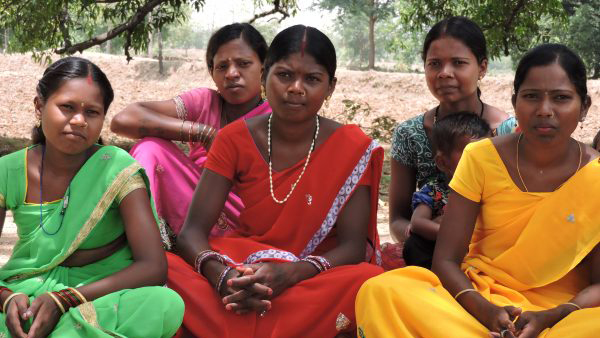Tusumani Mandi, 20, lives with her husband, Kartick, and two-and-a-half year old daughter in Kumbhiradih village, Purulia district, West Bengal. Just a few months ago, it was difficult for her to imagine a future where her daughter had enough food to eat.
Tusumani married Kartick when she was just 16, and they didn’t have any income or land to grow crops. To make ends meet, she and her family were forced to migrate to Bardwan for wage labor, but all of their earnings went to food, and they had no money to buy clothes or pay for health expenses. Their only option during an emergency, like last year when their daughter became seriously ill, was to get a high-interest loan from a moneylender. They’re still $73 (Rs. 5,000) in debt from this loan.
With no productive assets and little income, they were forced to live in a makeshift room in Kartick’s father’s home. Given their extreme poverty, Tusumani’s family is eligible for a government housing program that would provide them support to build house. However, because they were unaware of these benefits, Tusumani and Kartick hadn’t accessed this program.
Tusumani joined Trickle Up’s program, and used some of her seed capital to lease land where she could cultivate two winter crops, eggplant and bitter gourd, instead of migrating for work.
She received vegetable cultivation training with her other members of her self-help group (SHG), and she receives regular coaching from Jamgoria Sevabrata staff, Trickle Up’s local partner. She has invested $54 (Rs. 3,700) in her agricultural activities and expects to earn $206 (Rs. 14,000) in the winter season. She goes to the market to sell her vegetables, and has already earned $85 (Rs. 5,800).
Tusumani regularly attends SHG meetings and saves $0.29 (Rs. 20) each week, putting her total savings at $5.30. During the last lean season, she had no money to buy rice for her family but was able to take a loan from the SHG instead of resorting to a moneylender. She later took an additional loan of $7.35 (INR 500) so she could diversify her income by cultivating Babui grass. This native grass is used to make rope, which she sells at the market along with her vegetables. She has also been introduced to the government’s housing program and plans to access these benefits for her family.
Tusumani’s in-laws were skeptical about her ability to earn an income through these new agricultural activities. They were concerned when she and her husband chose not to migrate to Bardwan, but to cultivate their crops instead. With her success, they’ve been proven wrong.
“I have proved myself by earning money,” said Tusumani.



